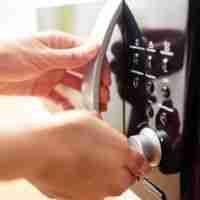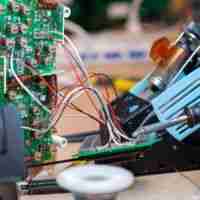Why is my microwave sparking. When a microwave sparks, it’s very alarming but not at all dangerous. Often, the sparking you hear inside your microwave is caused by food or foreign objects likely sitting too close to the heating element blowing out in an electrical arc.
When a microwave sparks, switch it off immediately and perform a visual inspection of the interior of your microwave for small loose pieces like partial popcorn kernels or food particles near the heating element, which is often located along the back wall.
If you see anything inside that looks like it might have caused the spark, remove it using tongs or another tool with a handle insulated from electricity.
Why Is My Microwave Sparking
We will discuss here reasons for sparks in a microwave and what to do in this situation.
1. Microwave with a metal scarp
A tiny metal fragment is enough to ignite your microwave oven. For example, if you have cleaned your microwave oven with steel wool and forgotten to remove the metal shards from inside.
Or even worse if you have accidentally heated an object in your microwave that had a thin aluminum covering over it – sparks can fly.
Make sure to check for any foreign materials inside of your microwave before heating something.
2. Damaged wave guide cover
The magnetron is a component of a microwave oven that generates microwaves. These strong waves heat food prepared in a microwave oven.
These waves are transmitted to the cooking area using a waveguide cover placed over the magnetron. The waveguide cover properly directs these waves to the cooking tray and prevents any particles or bugs from entering.
Some food particles or water moisture may attach to this cover during cooking, causing arcing (electric spark) between two points of the ground.
If this arc continues for a long time, it will harm the guide cover. Arcing between two locations is caused by a defective guide cover, resulting in faulty microwave oven operation.
As a result, it’s a good idea to check and, if necessary, replace your waveguide cover regularly to minimize future damage.
3. Faulty diode
A microwave diode, such as the one found in a microwave, is required for various heat-related applications. It wears out over time and can even be split apart because it works so hard.
If the diode has shorted, your appliance may produce sparks and sound like a loud humming noise. No heat will be created and no humming if the diode is defective but not shorted.
The burning smell associated with this problem could potentially suggest a faulty component on your machine.
If any of these symptoms occur with your device, a new microwave diode must be placed by a competent engineer; do not attempt to replace or repair it yourself, as this may result in permanent damage to other microwave elements or other electrical appliances in your home.
FAQs
Is it possible for a microwave to catch fire?
Microwaves and metal ovens have an interaction. As a result, sparks can ignite flammable materials. Keep popcorn away from the microwave because it is magnetic when on, and the steam accumulation could spark a fire.
What is a microwave’s typical life expectancy?
Microwave ovens have a lifespan of roughly seven years with typical use and significantly less with heavy use and poor maintenance.
A household may need to replace the appliance every four to five years if they rely on it to heat snacks and meals or defrost frozen goods.
Conclusion
Why is my microwave sparking. If your microwave is sparking, but no metal things are inside, the fuse has most likely blown. Understanding that this is one of the most common sources of microwave sparks is crucial.
If you have metal inside the microwave, such as a fork or spoon, this could cause sparking. Before calling in a professional, individuals should check their fuses first to see if their microwaves have started to ignite.
It could be as simple as burnout, but it’s always a good idea to make sure you’re spending your money wisely!
Related Guides




